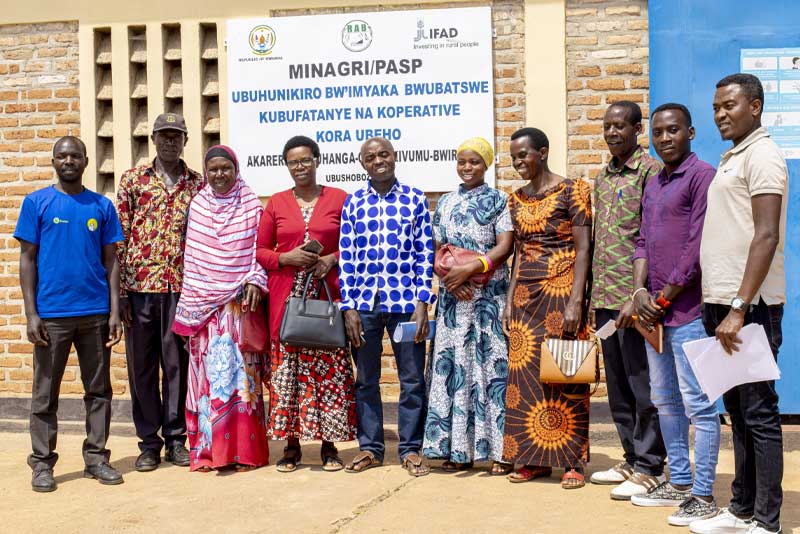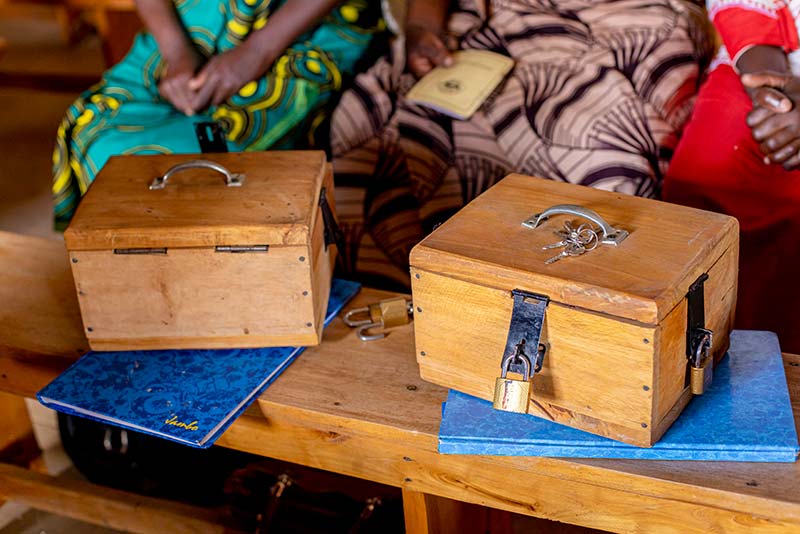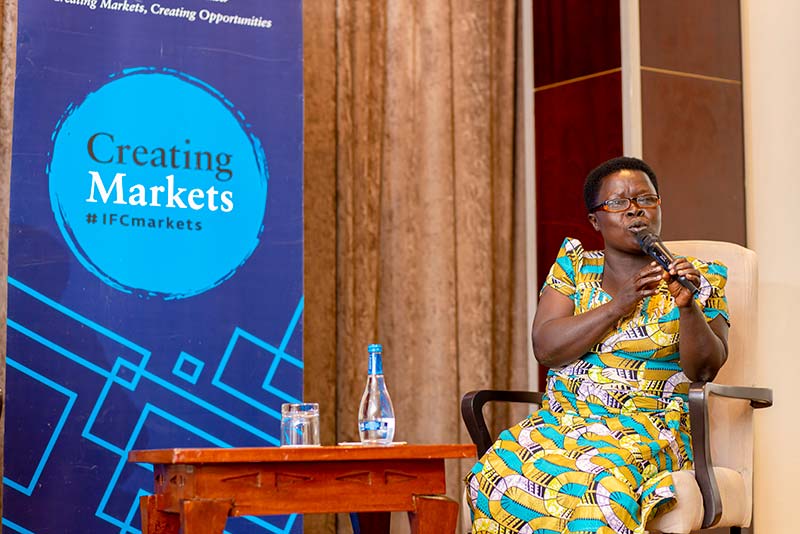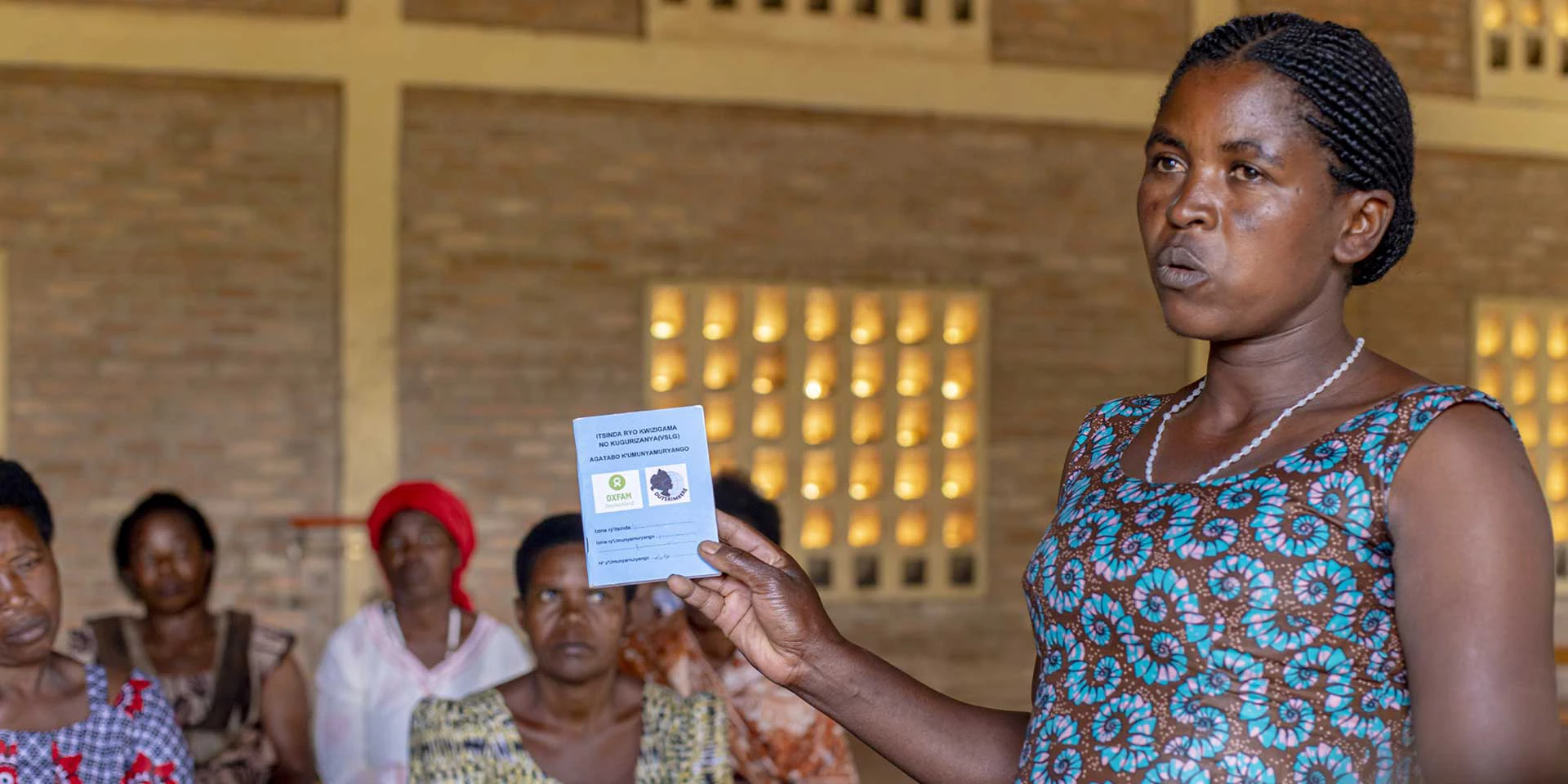By Daphna Berman
Euphrasie Nyirasafari, a farmer in southwest Rwanda, never imagined herself to be a community leader. Quiet and softspoken, she has long embraced a variety of other titles — from wife and mother to farmer and community member. But leadership wasn’t something she ever considered, let alone imagined to be attainable.
That changed after a training program came to her village in 2019. Over the course of 24 months, Nyirasafari — alongside other members of her agricultural cooperative — gathered in the local village meeting hall, not far from the home she shares with her husband and four children. There, she learned everything from proper planting techniques and post-harvest handling to contract negotiation and record keeping. When it came to nominating a president of the women’s savings group that the cooperative decided to establish, Nyirasafari was chosen to be its leader.
“It changed my life,” she said on a recent afternoon, the savings group’s ledgers and balance book in her hands.
Nyirasafari is one of the nearly 40,000 farmers trained as part of an IFC and World Food Programme (WFP) project that aimed to boost overall productivity and quality for smallholder farmers across Rwanda. As part of the project, which closed in 2022 and was supported by the Private Sector Window of the Global Agriculture and Food Security Program (GAFSP), trainers worked with 145 farmer cooperatives across the country, strengthening governance and financial management, as well as agronomy and post-harvest handling. The project, which was launched in 2016, also helped establish more than 700 women's saving groups, mobilizing an estimated $120,000 in savings that farmers used to access loans from financial service providers. For Nyirasafari, the change was dramatic: With the money her savings group put aside, she purchased high-quality seeds — rather than using leftover maize stalks from the previous year — which meant high-quality production, and higher income, come harvest. “I learned that saving isn’t just whatever is left over: You need to sacrifice to achieve your goals,” she said.

Members of the Kora Ubeho Cooperative in southern Rwanda,
where members received training to strengthen governance and financial management, as well as agronomy and postharvest handling. Photo by: Simeon Uwiringiyeyesu/IFC
Agriculture is critical to Rwanda’s economy, accounting for 31 percent of gross domestic product (GDP) and 70 percent of employment. But the sector is dominated by smallholders — who account for 75 percent of the country's agricultural production, making market access particularly challenging for local agri-processors. Land is also in short supply: As one of the most densely populated countries in Africa, there’s little room for Rwandan farmers to expand their holdings. Boosting production using existing plots is therefore critical to food security — and only possible with high-quality seeds, fertilizer, and other inputs, as well as good agronomic techniques.
As part of the program training, farmers learned techniques like proper seed spacing — and the benefits of moving away from traditional methods like intercropping, where two or more crops are grown in close proximity. Theogene Kwizera, a graduate of the program and president of a 2,000-person cooperative in Nyaruguru in the country’s south, says that production on his farm has grown more than 200 percent since completing the training.
“The project has ended, but we have the skills to continue growing produce and increasing yields,” he said. The extra 30 percent income increase has allowed him to cover school fees and health insurance payments for his five children — and with money left over, he’s also undertaken small home improvement projects.

The women’s savings group uses lockboxes to safeguard their members’ money. Photo by: Simeon Uwiringiyeyesu/IFC
Maize in Rwanda is the main source of nutrition and a critical crop for farmers, but it is mostly low quality and many farmers are unable to sell their crops in formal markets. Levels of aflatoxin, a mold-growing carcinogen, are particularly high due to the country’s high humidity levels, short dry season, and lack of mechanical, post-harvest practices. Though invisible to the human eye — and largely undetected by farmers — aflatoxin is associated with the suppression of the immune system, childhood malnutrition and is lethal in high doses. The training therefore helped farmers learn techniques to prevent the growth of aflatoxin — and Kwizera, for example, now dries his maize in trees rather than on the damp floor. “Before the training, I didn’t know what aflatoxin was,” he said.
Challenges faced by Rwandan farmers have mounted in recent years. COVID-19 made access to inputs or markets difficult during the country’s lockdowns — which stretched for several months in 2020 and 2021. Prohibitions on gatherings also meant that saving groups like Nyirasafari’s couldn’t come together to talk about their goals — or pool their contributions. The food security crisis exacerbated by the Russian invasion of Ukraine has also further intensified these challenges. Food, fuel and fertilizer prices have surged in recent months and essentials like cooking oil and rice have doubled in cost, leaving farmers scrambling to feed their families.
As part of an effort to protect smallholders from these shocks, the project worked to further professionalize the agriculture sector. The project’s trainers helped create market linkages to buyers and oversaw the signing of contracts between cooperatives and buyers. Coaches also worked closely with an estimated 2,300 cooperative leaders, creating a culture of empowerment so that farmers could access the premium market, where prices are higher, and leverage their collective bargaining power. Kwizera, for example, says that he learned to negotiate with financial institutions. “I now see that farming is a business,” he said.
In previous years, Kwizera said, the chaos and mismanagement at his cooperative meant that presidents never completed their three-year terms. Kwizera is now into his second three-year term — a first in his cooperative’s history — which he says would have been impossible without the training. “My members now hold me accountable and at every general assembly, I present how I’ve used our money,” he said. “We formed committees, so that it’s clear who is responsible for what.”

Seraphine Uwitonze, a maize farmer, at an IFC and WFP event in Kigali marking the closing of the project. Photo by: Simeon Uwiringiyeyesu/IFC
As the program came to a close this summer, IFC, WFP and GAFSP teams came together in Kigali, convening a group of development officials, agricultural experts and policymakers to share lessons learned and brainstorm about ways to further support Rwanda’s smallholder farmers. Seraphine Uwitonze, a maize farmer from Ngoma in the country’s east, was invited to the closing event, and from the conference stage, talked about how the program changed her life — and that of her family and community.
Uwitonze was one of the 900 women who were trained and coached to become cooperative presidents and as she told attendees that day, the project taught her a range of agricultural and business skills. But for Uwitonze, who never imagined herself traveling to a Kigali hotel to speak on behalf of her village — let alone getting on stage and talking to a room full of strangers — the experience was so much more. “I learned not to shy away from ideas that will improve the status of my family,” she said. “I never thought I was capable and now I know that I am.”
Published in March 2023
